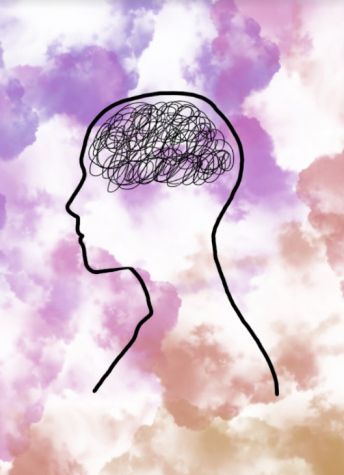The empath’s dilemma
Exploring my struggle with picking up on other people’s emotions
An illustration of the Instagram logo with 17 notifications that represent unread messages
May 15, 2021
I have 17 unopened Instagram Direct Messages.
They’ve accumulated over the course of a few days, and I keep telling myself I’ll open them later. A self-proclaimed extrovert avoiding talking to people? Preposterous.
Don’t get me wrong — I love talking to people. But the longer I wait to go through the messages, the more exhausting it seems to have to open all of them. Sometimes, I accidentally leave people on delivered for so long that it would be more rude to respond to them than to not respond at all.
Regardless, the question remains. Why do I have 17 unopened DMs?
I’ve always been prone to picking up on other people’s emotions. When I was younger, my feelings seemed to automatically echo those of my parents. When we’d all sit together at the end of a long day and play board games, they’d laugh at their bad luck while rolling dice, and I’d always laugh with them (only until I lost the game, though –– then I’d throw a temper tantrum). But sometimes they’d have bad days, and even when they weren’t visibly upset, it was almost like I could sense their irritation and would end up feeling frustrated too.
Obviously, a lot has changed since I was five. My feelings are more complex and less dependent on other people, but the emotions of the people around me continue to have a significant impact on my mood. I tend to avoid labels, but if I were to choose one for myself, it would be an empath — someone who feels other people’s emotions as if they were my own.
The other day, a close friend got accepted into a summer program. The moment she started talking to me about how excited she was, my stress about looming homework deadlines immediately dissipated and I instead spent the entire day smiling like a complete fool. Her happiness was my happiness, and by the way I was acting, you’d have thought that I was the one who got accepted.
Having strong empathy is an incredible gift when the people around you are happy, but unfortunately, the world isn’t always full of joy. This past year in particular has been a bit of a mess –– a pandemic is bound to cause complications for everyone.
In the last year, there have been numerous times when my family and friends were unhappy, and oftentimes, talking to them just makes me unhappy. My mood launches itself into a downward spiral parallel to their own, and I’m left unable to do anything about their problems yet I still have to deal with my own. I like making other people feel better and I like it when people confide in me — I take it as a sign of trust, and who doesn’t like it when people trust them? But sometimes, as much as I want to, I can’t make people feel better. I can’t solve their problems, and me providing a listening ear or giving them advice ultimately changes nothing about their situation.

Although I love being there for other people, I don’t always want their negative feelings influencing mine. Spending hours on end comforting other people is draining, and often leaves me too exhausted to do anything that isn’t really necessary. Which … includes responding to messages from others. See how those 17 unopened DMs come to fruition?
In addition, ignorance is bliss. I don’t like knowing that bad things are happening to the people around me — I don’t like seeing them in pain. So, if I don’t open their messages and if I just don’t know what’s going on, that should alleviate the possibility of negative feelings, right?
But of course, it’s not that easy, because among the feelings I endure when choosing not to take on other people’s feelings, the most prominent one is guilt.
I am extremely privileged — I have a loving family, amazing friends and nothing too crazy is happening in my life right now. Being sad because I can’t handle other people’s problems is such a small inconvenience in comparison to the awful things going on in other people’s lives, so who am I to complain about such an insignificant thing when others have it so much worse?
But the reality is that comparing other people’s problems to my own doesn’t solve anything — it doesn’t help them and it doesn’t help me. What is important, though, is that to be there for my friends, I need to be emotionally available. And for that, sometimes I need space.
I’ve never been able to vocalize these feelings before — what if it makes my friends feel like a burden? I am almost always willing to listen to other people and hear them out — I think it’s just one of those things we do for the people we love. I don’t want needing space to push away the people who once confided in me. It sounds strange, but I don’t want my friends to think about how I feel when they tell me things. I don’t want them to feel like they’re burdening me with their problems, because that isn’t what’s happening.
Not being able to ask for space is my personal problem. I don’t want anyone else to worry about it. If I can’t tell people that I’m not in the right headspace to comfort them, that’s not their issue to deal with — it’s mine.
I may never be able to stop picking up on other people’s feelings — but I’m OK with that. There are good and bad things that come with it, just like everything else. Maybe I’ll continue to feel the disappointment my friend feels when they get a bad score on a test they studied hard for, but I also get to feel the excitement of my friend when they successfully sell another art piece.
What I can change, however, is how I react. I don’t know how to set boundaries for anything — I never have. But maybe now’s the time for me to start.
Maybe the next time I feel overwhelmed, I’ll tell my friends that I’m not emotionally available. That I’m tired. That I can’t really handle anything. Honestly, I still don’t really know how to say it without sounding rude. Doing absolutely nothing and letting things continue as they always have seems like an easier option, but I wrote this in an effort to make myself implement change, so doing nothing isn’t a valid option anymore.
I’m tired of being, well, tired. I don’t know exactly where I’ll go from here, but I have found a place to start — and it’s with those 17 unopened messages. It’s small, insignificant and even a little ridiculous, but I’ll call it progress. Maybe I am starting (really) small –– but at least it’s better than not starting at all.


















